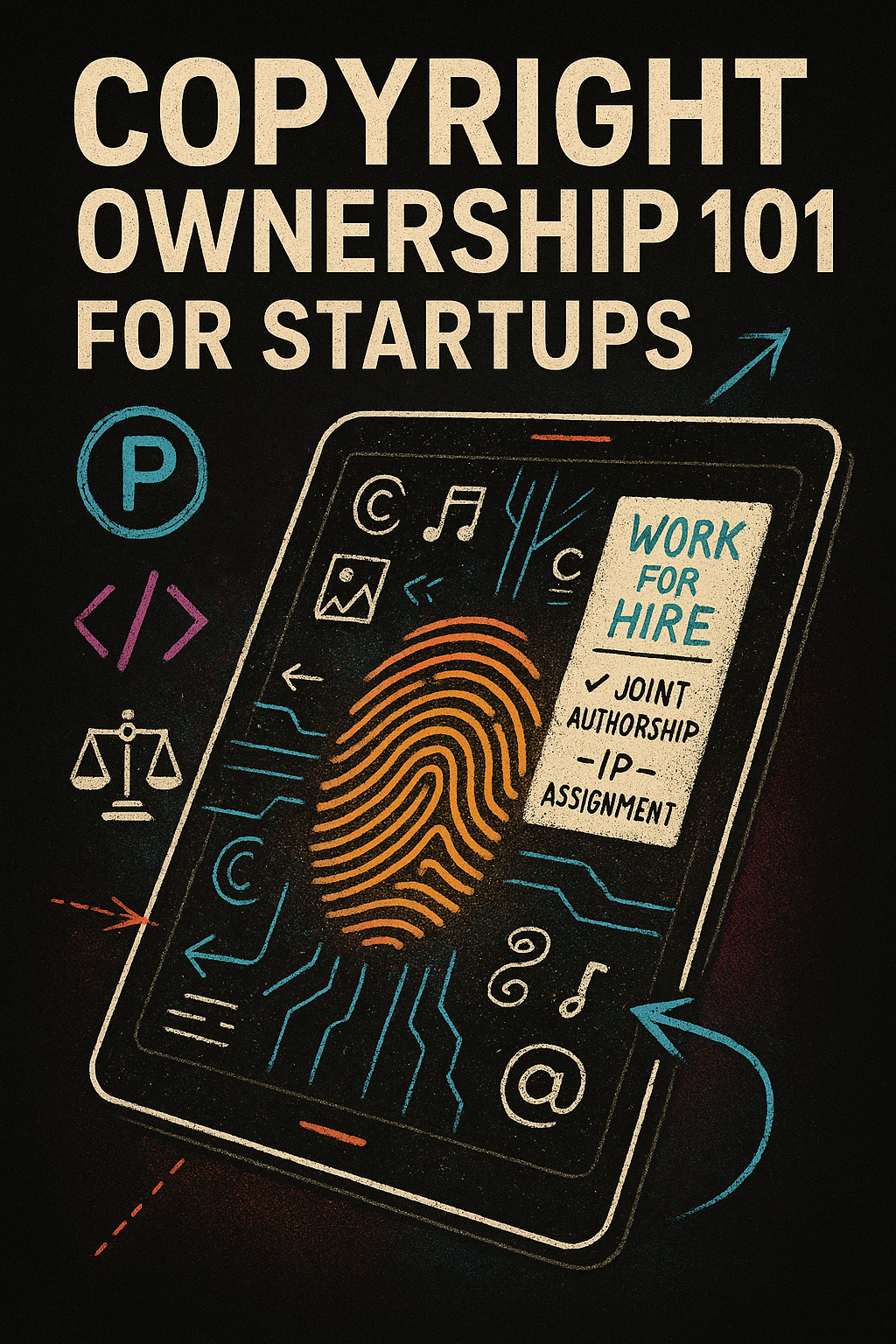Copyright Ownership 101 for Startups

For startups and their attorneys, understanding copyright ownership is essential for safeguarding creative assets, avoiding disputes, and leveraging IP as a valuable business asset. This guide covers fundamentals, the work made for hire doctrine, assignments, licensing, joint authorship, registration, software considerations, common mistakes, and best practices.
1. Fundamentals of Copyright Ownership
- What Copyright Protects: Original works of authorship fixed in a tangible medium, including software code, written content, graphics, music, and audiovisual works.
- Initial Vesting: Copyright automatically vests in the author upon creation—no registration needed to own rights.
- Exclusive Rights: Rights to reproduce, distribute, display, perform, and create derivative works.
2. Work Made for Hire Doctrine
The work made for hire doctrine affects ownership depending on creator status:
- Employees: Works created by employees within the scope of employment automatically belong to the employer. (McLane Middleton)
- Independent Contractors: By default, they retain copyright unless a written agreement specifies the work as "made for hire".
Key steps for startups:
- Use Clear Agreements: Include work made for hire provisions in employment and contractor contracts, with a detailed description of the work, a clause confirming its status as a hire, and signatures from both parties.
- Scope of Work Clauses: Define tasks, deliverables, and expected rights to prevent ambiguity. (FasterCapital)
- IP Assignment: Explicitly assign all created IP to the company. (JiaH Kim Law)
3. Assignment and Licensing
Transferring or licensing rights requires robust agreements:
- Scope of Rights: Clearly enumerate rights (reproduce, distribute, adapt) and limitations (territory, term). (Finnegan)
- Financial Terms: Define royalty rates, payment schedules, and audit rights. (Essent Law)
- Quality Control: For licenses, include standards to protect brand reputation.
- Termination & Renewal: Set conditions for ending or extending agreements.
- Confidentiality: Safeguard proprietary information and trade secrets.
- Sublicense Rights: Specify if rights can be transferred to third parties. (Copyrighted)
4. Joint Authorship
When multiple creators collaborate intentionally on a single work, joint authors share ownership. To prevent disputes:
- Create a written agreement detailing contributions, credit, revenue split, and decision-making authority. (Prosper Law)
- Document and timestamp each author’s contributions to establish clear authorship records.
- Agree on procedures for licensing, enforcing rights, and resolving conflicts. (Audiodrome)
5. Copyright Registration Benefits
- Sue for Infringement: Required for federal lawsuits. (USCO)
- Statutory Damages & Fees: Available if registered within three months of publication. (Fish & Richardson)
- Public Record: Deters infringement by establishing clear ownership. (Best Lawyers)
- Customs Enforcement: Detain infringing imports at the border.
Process: File online via eCO, submit a copy of the work, and pay $45–$65. Processing takes 3–6 months. (USCO)
6. Special Considerations for Software & UGC
- Software Piracy: The global software industry loses ~$46B annually to unlicensed use. (PDF Reader Pro)
- OSS Compliance: Understand permissive vs. Copyleft licenses; non-compliance can force open-sourcing proprietary code. (Wikipedia)
- DMCA Safe Harbor: Implement takedown policies, designate an agent, and remove infringing UGC promptly. (Copyright Alliance)
7. Common Mistakes and How to Avoid Them
- Informal Agreements: Always use written, signed contracts for employees and contractors. (JD Supra)
- Unclear Ownership: Document IP creation, chain of title, and assign rights explicitly. (WIPO)
- Missed Registrations: Register key works promptly to enable enforcement and statutory damages. (Buzko Legal)
8. Best Practices Checklist
- Conduct an IP Audit to catalog creations and third-party components.
- Implement Work for Hire and IP assignment clauses in all contracts.
- Register copyrights and trademarks early.
- Maintain a DMCA Takedown procedure and appoint a registered agent.
- Draft clear license agreements with defined financial, quality, and term provisions.
- Establish joint authorship agreements when collaborating.
- Train your team on IP policies and compliance.
- Monitor the market for infringements and enforce rights proactively.
9. FAQs
Who owns code written by a contractor?
By default, contractors own their creations. Use a written work for hire or assignment agreement to assign ownership to the startup.
Can I assign rights after creation?
Yes, you can assign copyright via a written agreement, but it’s best to define ownership at the outset.
What if I forget to register?
You still have copyright, but you cannot sue for statutory damages or recover attorney’s fees until registration.
Conclusion
By mastering copyright fundamentals—from the work made for hire doctrine to registration, licensing, and enforcement—startups can safeguard their creative assets, avoid costly disputes, and unlock new revenue streams. Proactive IP management is not just legal compliance—it’s a strategic advantage in the competitive startup ecosystem.
Further Reading:

